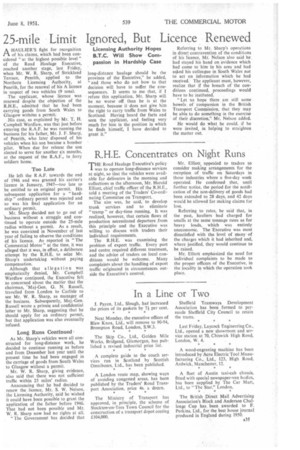R.H.E. Concentrates on Night Runs T HE Road Haulage Executive's policy
Page 53

If you've noticed an error in this article please click here to report it so we can fix it.
was to operate long-distance services at night, so that the vehicles were available for deliveries in the morning and collections in the afternoon, Mr. Harold Elliott, chief traffic officer of the R.H.E., told a meeting of the Traders' Co-ordinating Committee on Transport.
The aim was, he said, to develop trunk services and to eliminate "tramp" or day-time running. It was realized, however, that certain flows of production necessitated departure from this principle and the Executive was willing to discuss with traders their individual requirements.
The R.H.E. was examining the problem of export traffic. Every port and centre required different treatment, and the advice of traders on local conditions would be welcome_ Many complaints about the handling of export traffic originated in circumstances outside the Executive's control.
Mr. Elliott. appealed to traders to consider making arrangements for the reception of traffic on Saturdays in those industries where a five-day week operated. He confirmed that, until further notice, the period for the notification of the non-delivery of goods had been extended to 28 days, and 42 days would be allowed for making claims for loss.
Referring to rates, he said that, in the past, hauliers had charged for smalls at the same tonnage rates as for heavy loads, which was entirely uneconomic. The Executive was most dissatisfied with the level of many of the chat ges which it had inherited and, where justified, they would continue to be raised.
Mr. Elliott emphasized the need for individual complaints to be made to the proper officers of the Executive, in the locality in which the operation took place.




















































































